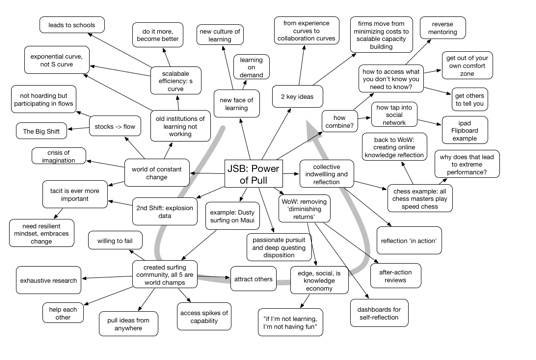For the annual eLearn Mag predictions, this year I wrote:
I think we’ll see some important, but subtle, trends. Deeper uses of technology are going to surface: more data-driven interactions, complemented by both more structured content and more semantics. These trends are precursors to some very interesting nascent capabilities, essentially web 3.0: system-generated content. I also think we’ll see the further demise of “courses über alles†and the ‘all-singing all-dancing‘ solution, and movement towards performance support and learning facilitation driven via federated capabilities.
I think it’s worth elaborating on what I mean (I was limited to 75 words).
I’ve talked before about web 3.0, and what it takes is fine granularity and deep tagging of content, and some rules about what to present when. Those rules can be hand-crafted based upon good guesses or existing research, but new opportunities arise from having those rules capitalize on rich data of interactions. Both based upon some client work, and what I heard at the WCET conference, folks are finally waking up to the potential of collecting internet-scale data (e.g. Amazon and Netflix) and mining that as a basis for optimizing interactions. Taking the steps now have some immediate payoffs in terms of optimizing content development streams and looking anew at what are important interactions, but the big returns come in creating optimized learning and performance interactions.
The second part is a bit of evangelism hoping that more organizations will follow the path foreseen by my Internet Time Alliance colleagues, and move beyond just training to covering informal learning. I’ve talked before about looking at the bigger picture of learning, because I’m convinced that the coming differentiator will not be optimal execution but continuing innovation. That takes, in my mind, both an optimized infrastructure and ubiquitous access (c.f. mobile). It’s more, of course, because it also implies a culture supportive of learning, yet I think this is both an advantage for business competitiveness and a move that meets real human needs, which makes it an ideal as well as real goal.
The eLearning Mag predictions should be out soon, and I strongly encourage you to see what the bevy of prognosticators are proposing for the coming year. I welcome hearing your thoughts, too!



